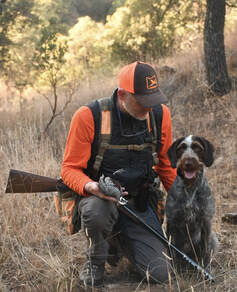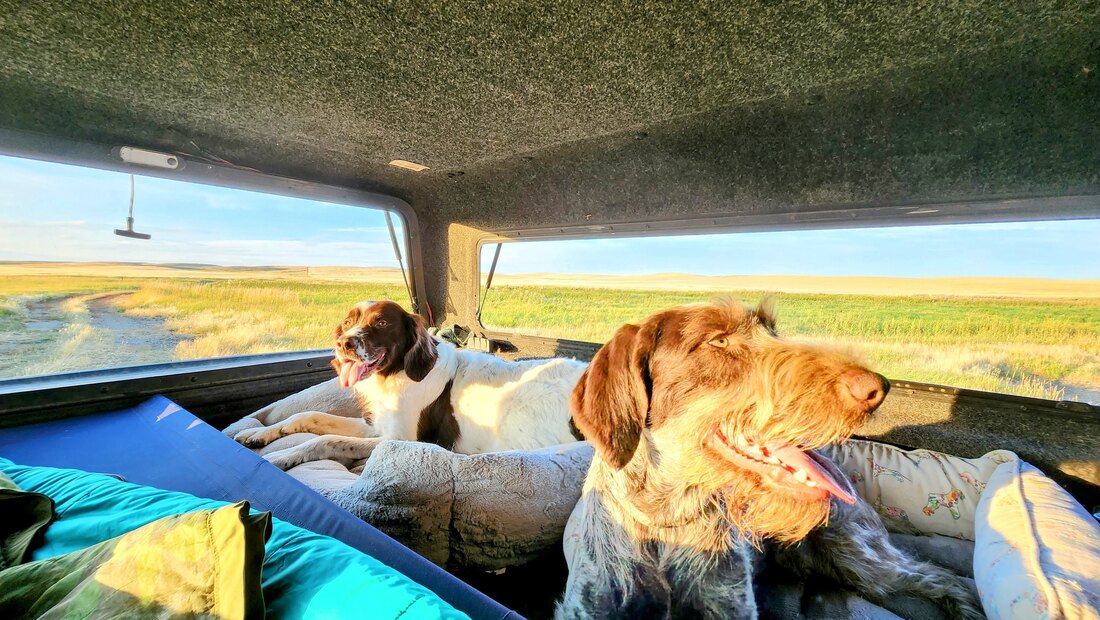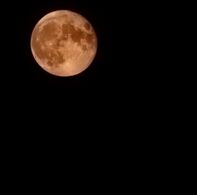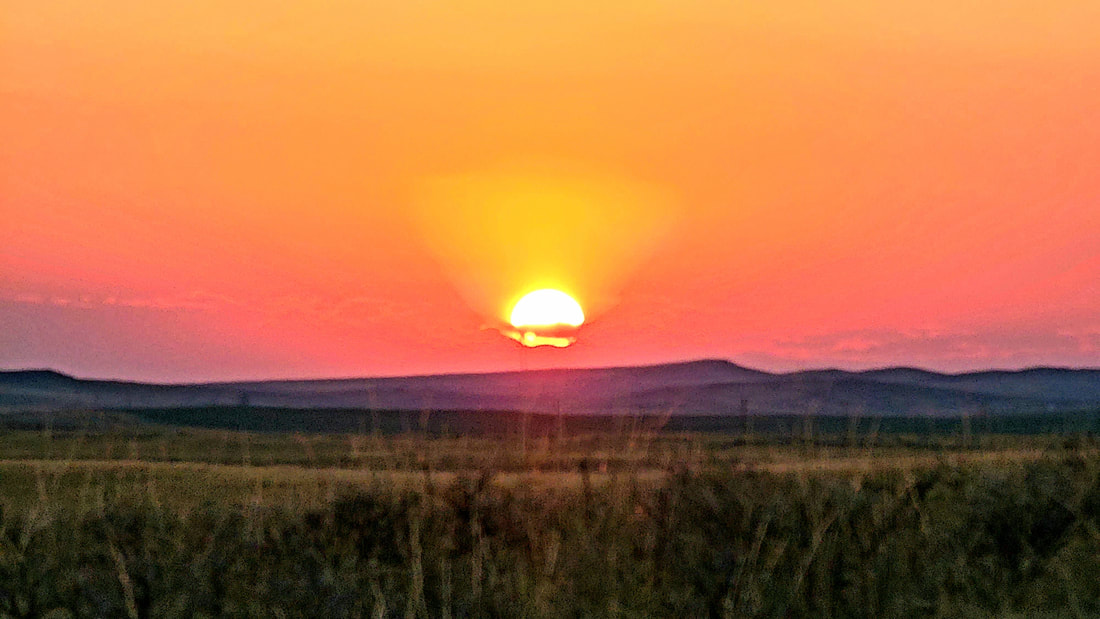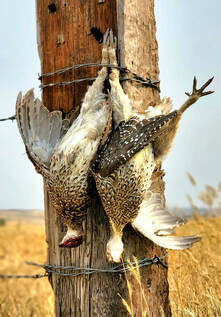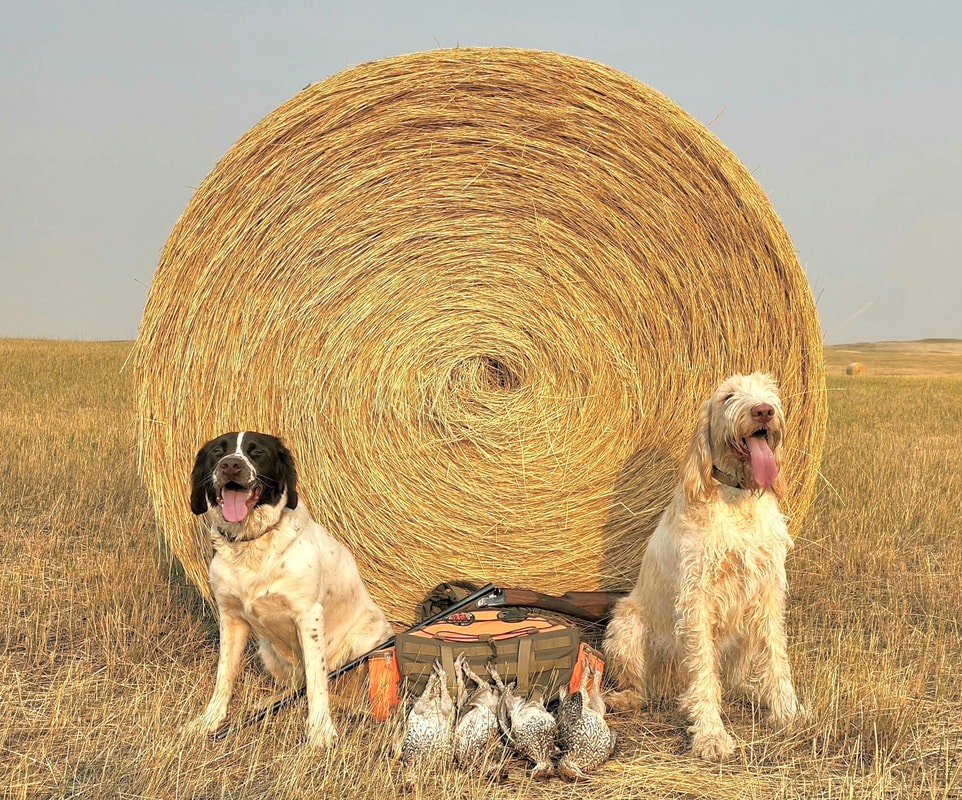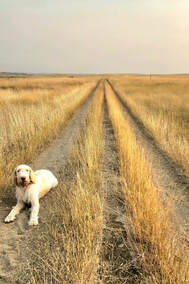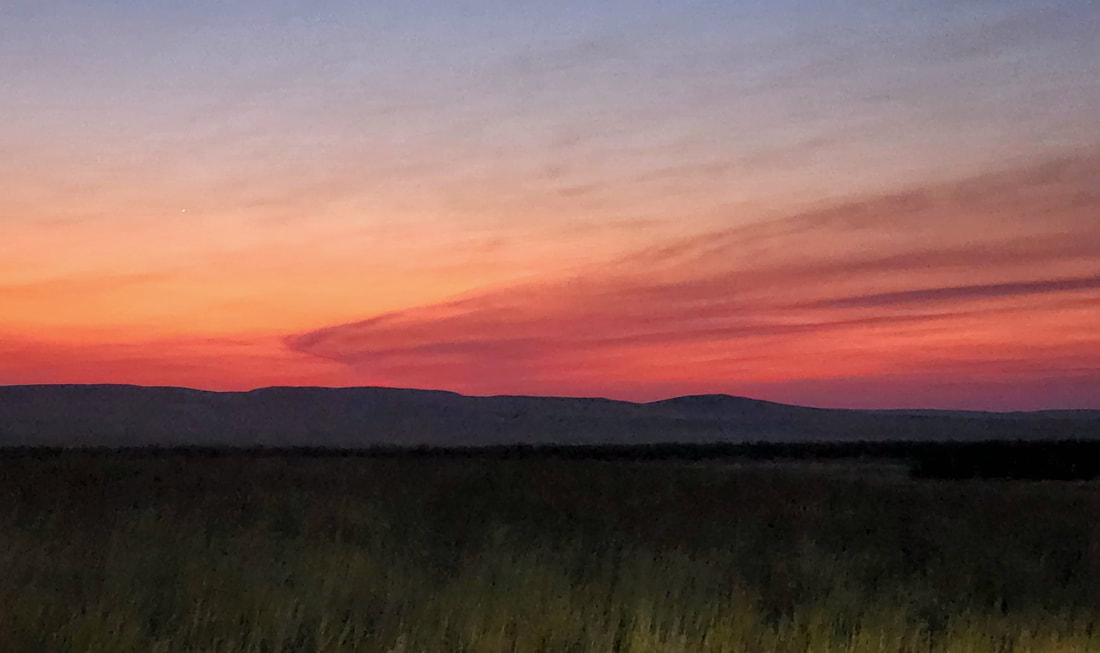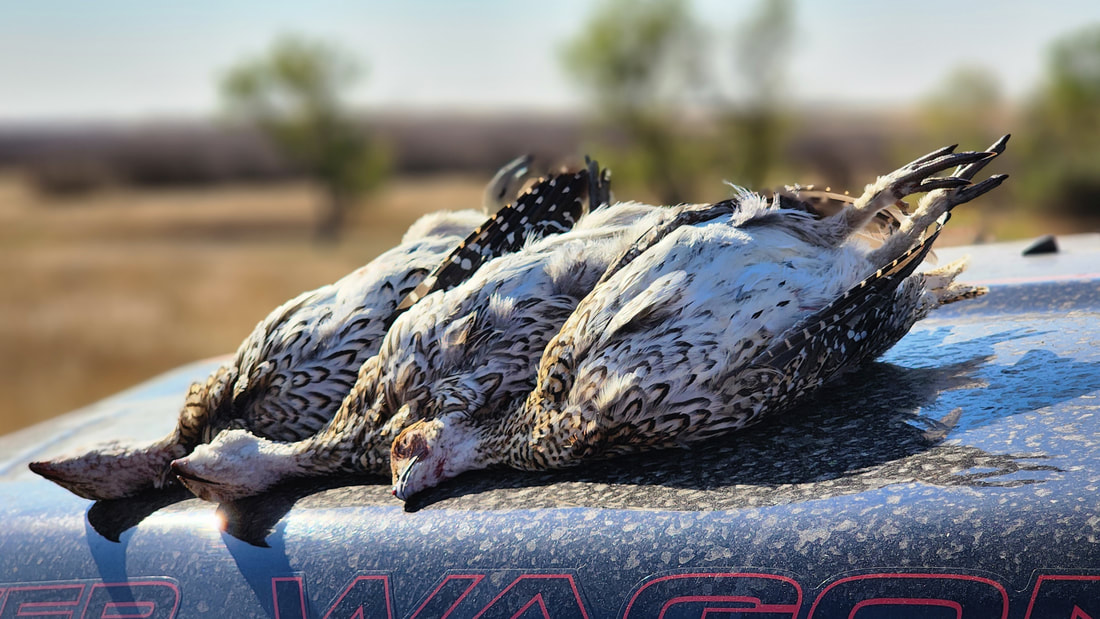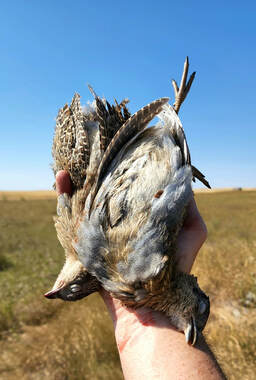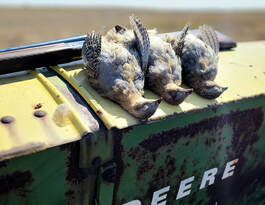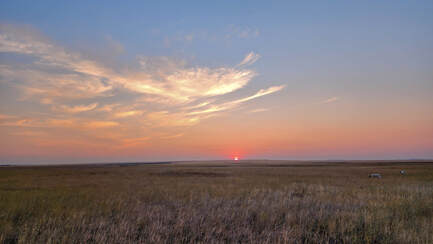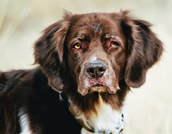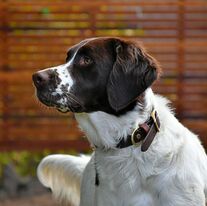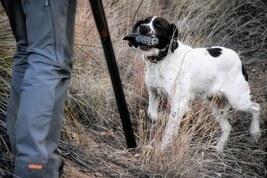 I learned that temperatures in the low 100’s for over a month straight caused any early season chicks to perish from exposure, since they would have been incapable of regulating their body temperature. Additionally, due to the high heat, hens will not lay eggs. Then there was the “heat dome” itself, which caused the vast majority of the much-needed monsoon storms to skirt around the areas most needing them to create food and cover. Then there is this other massive complication, the ranchers and the Forest Service itself. 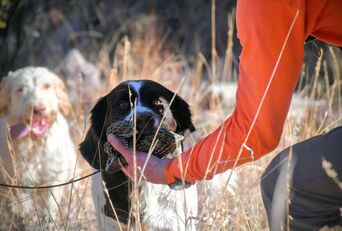 The winter rains of ‘22/’23 created a bumper crop of prairie grasses. It was incredible! So the ranchers brought in record numbers of cattle to eat all of this grass. In sixteen seasons of hunting the same region, I honestly can’t think of a time where I saw so many cattle. Then the heat dome sat in, and warded off the summer rains, aka monsoons. With that grass production halted and the huge herds acted like cancer of the prairie and consumed tens of thousands of acres of Forest Service land down to rocks and dirt. Many areas simply looked as if a bomb had gone off. The cattle were even eating young mesquite shoots, and old yucca leaves. It was surreal. Ranchers aren’t always the stewards of the land that they oft claim they are, and the U.S. Forest Service gets and F- for their management efforts. 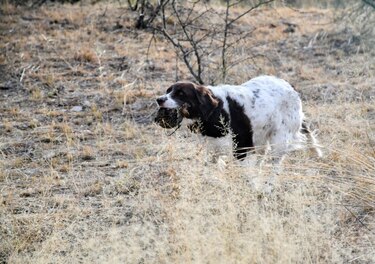 As you might imagine, it all made for a tough year for the quail. With ground cover either being non-existent or in fairly rough shape, the Mearns, famous for holding tight, were acting a lot like desert birds and running like track stars. It was hot, mid-70’s, no cloud cover, and no air movement. Basically, it was tough, but there were birds. Some areas coveys weren’t healthy, maybe two or three birds – no shooting, and we never went back. In other areas, coveys were healthy, the typical six to eight birds and in select places there were large coveys, twelve or more birds. The trick was to find places where the rain managed to sneak in, where the terrain and cover created cooler micro-climates where the birds could thrive. 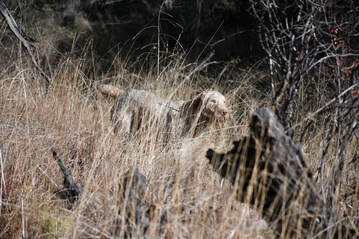 With all that being said, was it really that bad? Well sort of, but also not at all. Thankfully word got out, and the army of hunters who normally find their way to the region flagged off and went elsewhere. So, hunting pressure overall was much lighter, basically COVID levels. Still people figured out some of the bigger easier to get to areas and turned the screws, sadly decimating the quail populations that were there… We continued to explore new to us areas… We certainly found our share of birds and Ila turned out to be the hero of the trip. Despite tough conditions, she managed to come through over and over for us. Everyone else did well, and even little Rye started to figure out how to work in the hot, dry conditions.  In fact, the dogs did such good work overall, I had several days my shooting (hitting) was 100%! I don’t know that I’ve ever had a day of quail hunting where I hit everything, I shot at let alone several of such days! When the dog has the birds dead to rights, and you have the opportunity to walk up slowly and calmly, consider your shooting lanes, or on many cases, windows. Release the dog for the flush and pick your bird(s) in a quiet Zen state, wow, just wow. Of course, I had a few days I didn’t do so well, but that is rough shooting for you, and Mearns quail hunting is oftentimes some very rough shooting! All in all, we had a solid season, and made a few new friends. We can only hope the monsoons are good this coming summer, the ranchers scale their operations accordingly, and that the Forest Service does their job to protect the land.
0 Comments
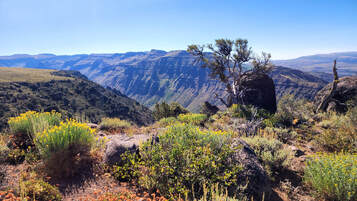 Yes, you read that right. There are easier and far more typical places to hunt Sage Grouse, but when Dominic Bachman invites you to go hunting with him, you clear out your calendar to make it happen. Even more so when the hunt is in such a unique and challenging environment. This distinctive southeastern Oregon hunt must be applied for in advance, then if you are lucky enough to be chosen for this intense event, with less than a 10% chance of being drawn, you have to be prepared for high elevation. All the best hunting is right around 8,000 feet of elevation. The breath-taking views encompass Hawaiian-like canyons, dramatic mountain peaks, desert oasis’ and alpine lakes – all in one spot! The hunting itself is incredibly challenging, even more so for me since I battled intense bouts of sciatica the entire time. The sage brush is low, compact and incredibly dense which makes walking nearly impossible. Each step is literally more akin to a high step march, with the footing of each step being questionable. This was hard and I wanted to quit, badly. But I was there. I signed up for this adventure for this experience. So, I did my best to put my big boy pants on and see it through. 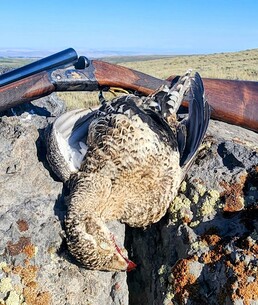 1st Grouse in the bag with my 20 ga. FAIR 1st Grouse in the bag with my 20 ga. FAIR I brought Ila, Fizzy and Rye along for this adventure. Up before dawn and rolling in the dark to a new location can be a surreal experience; follow the leader. With the sun beginning to light the horizon on fire, I took solace in having downloaded a lot of extra maps in my OnX. We arrived and Dom said, “This is your oyster”. A large roughly triangular shaped piece of mountain slope with a few rocky knobs. We Jimmy Jammed from the bottom to the top – straight into the sun. With sciatica firing off with nearly every step, and in some cases shorting muscles out robbing me of what little power I have. Good times. For this first hunt I had Rye and Fizzy down, once at the top, we began to roughly zigzag the rest of our “field” back down and roughly into the wind. It became clear that bird numbers where not what Dom had anticipated. I kept waiting to hear a shot in the distance… because we had nothing. No sign at all. This hunt got long, my legs a tad wobbly, and mentally I was starting to check out. I began to wheel around to the left to make what would be one of the last zigs to be made. Within a few steps, the girls began to come around. BAM. Rye froze, Fizzy froze. I completed my step, and a grouse few wild! I took a passing shot and wiffed but had the presence of mind to look back to exactly where it came from, as it was highly likely there would be more. On cue, a second bird few, and with a little more zen I took and made the shot! We were on the board. We hunted later that day, still with no success for the party.
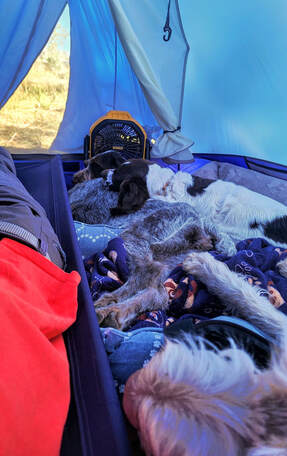 Never underestimate the value of a nap with friends Never underestimate the value of a nap with friends We got the spare on, then took Dom’s truck to do some exploring and decided to hunt the hilltop above where he and Aaron had collected three birds earlier in the morning. I had Ila down, as I really wanted her to have a successful Sage Grouse hunt. As we were coming to terms with the hunt turning into a walk with dogs whilst carrying firearms a single grouse flew wild from Dom’s right. Once the grouse had cleared the dogs, he dispatched the bird with a cool dispassionate efficiency. He was done, which was good for him, as he needed to pack up and go home…he had to work in the morning. We had a good laugh over Aaron’s misfortune the morning before. Their hunt took them basically up to my tuck, where they had seen a few grouse land near. They had dropped off some of their surplus gear in my truck, and while they were farting around, Aaron had discovered an interesting perfectly heart shaped rock. He stepped on it and it gave more than he had anticipated, which prompted him to turn in over. This is when he learned I had used said rock to cover my morning expurgation. He was, mortified. This gave Dom and I a hell of a good laugh. Day two ended with a beautiful, but unproductive hike where I ran all three girls in a Hail Mary attempt to pick something up. 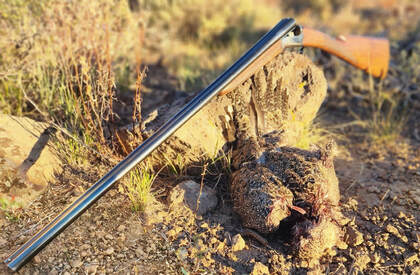 2nd grouse, taken with my 28 ga FAIR 2nd grouse, taken with my 28 ga FAIR I was prepared to leave early to get to Burns to have the truck checked out, after all the steering wheel was rocked nearly a full 90-degrees out of whack. Not an exciting prospect when facing an eight-hour drive home. Jenna and I chatted, and she convinced me to go ahead with the plan to do the short hunt close to camp, if for anything just for the girls to stretch their legs – tomorrow was going to be a long day in the truck for them, in particular if I had to wait to be seen at the Les Schawb there in Burns. The only place in a zillion miles that could be of any help to me. We set out, and about 30 minutes in I was about to turn back to the tuck to wrap this encounter up and there it was. A single grouse turd. Really. One single grouse turd, old and dried up. All alone. I laughed to myself. Only I would find a single grouse turd. Within a few steps an old roost. Hey, not bad I thought to myself. Then another ten feet, another roost, then another, and another. My hopes began to rise. This had been the most sign I had seen in all the hunting I had done thus far. But where were they? Up to my left a single snowberry bush stood proudly above the sage like a sore thumb. As Fizzy approached it, a single grouse flew wild, and it bombed down and into the ravine to my right. No way for any shooting there, and really there was no way I was going down after it. My brain clicked on, go to the bush! As I did Ila and Rye came around and became birdy. Rye hung around the snowberry, Ila went into tracking mode, head down, tail swishing. She was on ground scent. They were running! A bird flushed wild well out ahead of her. I shot; the bird was down! I was finished. I had done it. I had made it through the difficulties, it was a great feeling to have. Would I do it again if given the opportunity to do so again, yes, of course. It was an incredible trip, thanks for inviting me Dom! 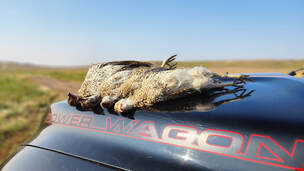 What a grand time we had! Now that is out of the way, I’ll share a few details with you. I took Powder and Rye on the paired down, lean camping trip for Sharptail and Hungarian Partridge in Northeastern Montana. These early season hunts have marked temperatures in the 90’s, which limits how long you can be out running dogs even more so than the relatively low limit on Sharptail. However, if your shooting is on point, your day can be closed out in a matter of minutes! We camped within a quarter of a mile of the Canadian border. With the windows on the truck canopy fully open to allow the breeze to cool us and blow the flies out, we were gifted with the occasional call of a Sharptail. I had indeed picked a good spot! Later that night we had a “Blue Super Moon”, which Rye wasn’t too sure of. She did her due diligence to ward it off initially, but in the end she settled to watch it carefully while Powder and I slept. 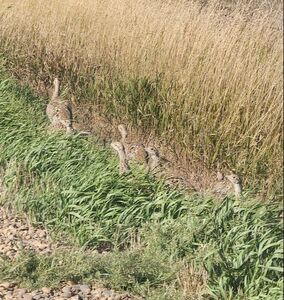 In the morning we were hunting directly at legal light and were in birds a few minutes later. The girls did their job, and I did mine – we were on the board with our first Sharpie. The covey flew a short way uphill, landing at the fence line directly below where a large raptor had been roosting. Our presence kept the raptor from doing what it wanted to do, and amidst the confusion, the grouse flushed again over the hilltop and to the Northwest. I thought perhaps they had landed short to take advantage of the better cover, but I was wrong. The covey rose as a group out of range. As soon as we resumed our walk, that is when a much larger covey just a little way further up the hill took flight – well out of range. Popcorning to the sky, easily 30 birds if not more. They wanted nothing to do with us. Once they were gone, Rye was still standing… 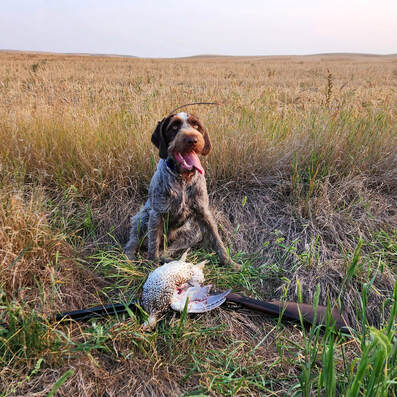 We looped around the wheat field to hunt the lower portion of the hills to the south. I zigzagged into and out of the various levels of cover for a while then settled on a little higher elevation where a dozen or more deer had been resting. Right in the middle of where the deer had been camped out the girls got birdy. Powder swung wide and to my left. Rye stayed pretty much right in front of me only about 40 yards out, and went on point as soon after the “good cover” turned scrapy and thin. Her tail was vibrating vigorously, so much so it appeared she was flagging! I approached her, and stroked the underside of her tail to steady it. Her body tensed and birds started to fly. Rye stood. I shot and took a bird. Looked to Rye, where she still stood, and I took another shot toppling our third bird of the day, and a true covey rise double. Rye still stood. I was beaming and remembered to shout, “hunt dead”. Powder had begun to retrieve the second bird first, which they carried in together. The softer hit first bird evaded us for a while, but it was Rye who found the young male for me in some deep cover! 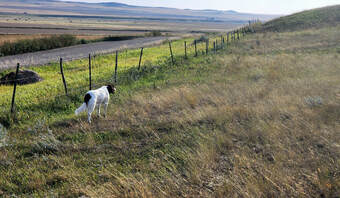 Barely five minutes later we were into another covey. Powder was first on the scene. She bumped them, and three or four birds came up. The girls were steady, so I shot and subsequently missed. Powder gave a little chase, and more birds came up. Then a few more. On the last of the covey, both girls stood smartly, and I took a passing shot on a Sharpie with it’s warp drive online and managed to dump it. Rye located the bird and retrieved it to within a few feet and set it down. I’ll take it. She has been reluctant to retrieve whole birds, despite enjoying retrieving all sorts of unusual items. It has to start somewhere! By the time we had made it back to the truck, the heat was up, and becoming quite oppressive. We ate our breakfasts, and I got to make my coffee. We spent the rest of the day scouting for a new camping spot and hunting grounds. 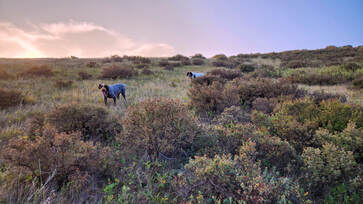 Sparing you some of the agonizing detail, day two was also an equally great day of hunting and dog work, in particular from the puppy, Rye. We had six coveys of Sharptail within 600 yards of the camp and had my shooting been half as good as opening day we would have been shut out within fifteen minutes of starting our day! But alas, my hit ratio took irreparable damage for the season… Of note, Rye offered to honor Powder a couple times without any intervention or encouragement. Day three we camped near to the Canadian border again, and had another great day of hunting, dog work, and shooting! Later that morning I got invited to hunt with a couple of friends a few hours away. Me being who I am, and being easily confused with my days and dates left the area 24-hours before I should have… None the less visiting with Eddy and Anita is always a treat, so I have no regrets for making time to visit with them. We left for the mountains the following morning for Rye to have a chance on Blue Grouse – she didn’t disappoint! 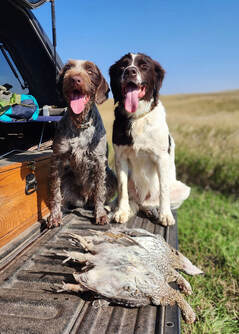 The longer I have been into upland hunting, the more I have gotten into quality dog work. It is fun to watch and be a part of. Additionally, it’s safer for the people and dogs involved and typically offers the easiest/best shooting opportunities that can be had for the situation at hand. My journey to learn highly effective and humane techniques has been fairly well documented here in this blog. As I have slowly gained proficiency as a trainer and handler over the years, my dogs have also become better and better in their performances. One hand washes the other. Making the whole experience more and more rewarding. Next, we depart for a special opportunity to hunt Sage Grouse in the Steens Mountains of Oregon… possibly another story will need to be told? In memory of Fowler: 10 May 2010 - 26 April 2023 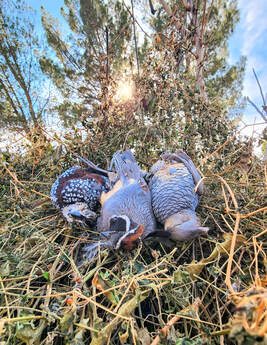 Since you are reading this, it is a safe bet we are back in cold, dark, and wet Spokane and we are no longer in the business of shoveling sunshine and hunting quail in the high desert. I could make this the shortest recap ever: we had a great trip. But then that isn’t a lot of fun now, is it? A week prior to heading South for the big Pheonix dog show, Jenna had gone to Oregon to help our friend Stacey. It was an eventful stay, and to say the least, Stacey was helped, as was Mr. Kim & Laura. A made for TV drama if there ever was one. As an added kicker, she contracted COVID and it hit her while on the 9-hour drive home. Jenna did a turn and burn move, and we left with her having barely 24 hours at home. It is a full twenty-hour drive from Spokane to Pheonix, and all was going well until we were about five hours out – the VID hit me like a freight train, and I had to pull off the road. Driving was no longer possible for me. Day one I missed the dog show, then life began to return to me. We wore our masks, and stayed away from people, which was pretty easy to do at the enormous West World horse pavilion. Ila did pretty good in her Open shows, and Fizzy did well in all of hers, as we have come to expect. After the show cluster ended, we headed further South and got started with some desert quail hunting. 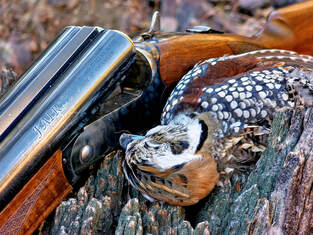 My buddy Jacob had invited us to check out an area he liked for desert quail, and it turned out to be an amazing time. In the low spots there were Gambles quail in abundance, on the ridges, there were plentiful numbers of Scaled quail. Wow! I even took a Scamble, a primarily Gambels quail with Scaled quail feathers on its chest – super cool! The different species in this location literally were a few yards apart in many places, very easy for overlapping and Scambling to happen. Good times were had, and we are still grateful for the opportunity to hunt such a cool place. With the Mearns opener on the horizon and a hunting buddy from Spokane coming down to fulfill a lifelong goal of hunting Mearns quail – we were hyper focused on getting into birds. Not just hunting our usual coverts. But to continue something we started last year. Jacob and I had a friendly competition running on finding new and unique coveys. I had stopped marking coveys a long time ago, and had just hunted haphazardly here and there, and many times into the most rugged and insane habitat the birds would live in. A sure-fire way to find birds in the hard and down years. After a few friendly jabs, I started marking my covey finds last year. We ended that season with over 80 new to us finds, which was pretty cool. More importantly it got us thinking more deliberately about where we hunted, and how we hunted the areas we did hunt. We were never really keen on repeating hunts, even in the tough years, but this new game really got us thinking. 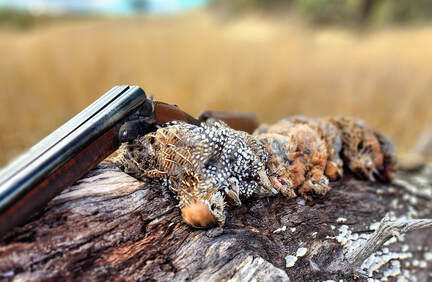 Jenna and I spend our summers training, showing, and fooling around with our dogs, but also, we have an unusual hobby of tracking rainfall for the areas we prefer to hunt in Arizona. Mearns quail populations are tied directly to the summer monsoons. So, knowing when and where the rain fell would likely help us to produce more finds. One might think this would be easy since rainfall data can be found with relative ease on the internet… but not if the primary area you hunt, over a million acres, doesn’t have any rain gauges! We use a myriad of odd sources, and spend time watching the active weather radar, which helps us to identify areas of interest. I then draw borders on these areas in OnX for us to go and investigate using boot leather. This past season was a high-water mark with how extremely systematic we were with this approach. In all we located and identified over 140 new and unique coveys for us during our thirty days of Mearns hunting. We did hunt a few Old Hunts so our total covey count was a good bit higher, but what really interests us is the “new to us” category. It serves to validate our methodology and makes the exploration into the unknown even more rewarding. We rarely hunt past noon, that more or less makes us “half-day” hunters down there. Say what you will, but we aren’t there to make money. Making it back to the house by one or two in the afternoon to eat, shower, relax, and enjoy some of what the area offers is also part of the package for us. We are proud of what we do and how we do it, one or two dogs on the ground at a time, a casual pace, and short-ish days. If you are running three or four dogs at a time, doing a crew swap at lunch to have fresh dogs on the ground and hunting until dark – well, I’d hope you are finding more – better yet, do some better hitting and you’ll have to stop! Most folks I compare notes with find much fewer coveys and spend a good bit more time walking…but I digress. 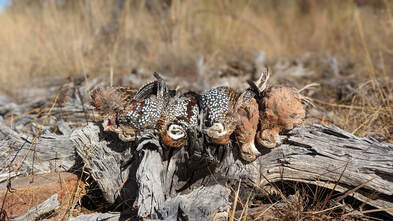 We’ve also always kept a soft count on covey finds for each dog, but this year, and the number of birds we were finding got a little more serious in this department as well. The Leader Board Emerged. We established a few easy rules. Coveys would be counted even if the dog made errors, it just happens e.g. bumping. If we were running two dogs and they both pretty much tied into the covey at the same time both got credit. If one was on a covey first, they got solo credit, the backing/cooperating dog was along for the ride. We joked about figuring out a handicap in the event a dog with a bunch or errors passed a dog with few to none…it was close, but it didn’t happen. So, for now that will remain a project for another day. You may find the results surprising. The Old Guy Fowler came in last, but also with the fewest days hunted by far, with 14 coveys. Tule was 4th with 15 coveys. The Queen of Mearns Hunting (8 seasons), Powder, came in 3rd, with 35 coveys. Ila was second with 51 coveys. Fizzy, in her 2nd hunting season, came in 1st with 54 coveys – also with the fewest errors by far! What does it all really mean? Well, having several months to reflect on this I can say we had a grand time! We hunted with new and old friends, had dog work I couldn’t have dreamed of just a few years ago. I my shooting was always on point (that’s a joke kids), and at times it was the things that fuel the creation of colorful memes, but I also had days where my hitting was literally the stuff that gets written into song. If I never had a Mearns season like this past, at least I had it as an incredible high-water mark to remember contemplatively while enjoying some fine libations with the sun on my face. Not a lot to say, other than we had an exciting time and definitely found our share of birds. We hunted hard and the girls did some excellent work and upped their game to meet the edginess of the mid-season birds. Not to be mistaken for the puppy friendly early season birds... Each dog was able to work and point Pheasant, Hungarian Partridge, and of course, Sharptailed Grouse on this blitz style 5-days of hunting trip. Sadly, I started off by missing some great opportunities to take game I had been gifted with. However, I managed to find my mojo at an undisclosed location and started filling the bag and completing great hunting sequences for the girls - which was nice. Here are a few shots, in no particular order, from the trip. During hunting season, we have been taking some time to moonlight for Sage Canyon Outfitters guiding discerning clients on preserve hunts. I get to hunt the girls at least twice a day for some really good folks. The sets are rather generous, and we can easily expect 25 to 50 points per hunt... tailgate photos are about half the birds taken on each hunt (I must do a drop and call for support). Tule likes to sneak in for the group shots, while Ila and Powder prefer to lay in the shade and drink water, Fizzy tends to be all business unless there is mud to roll in. Here are only a few of the group photos from that vigorous five days! Enjoy
Mountain grouse, as they are called in Montana, are not for those weak in the knee or faint of heart. Sure, you don't need to be in Boston Marathon shape, but that would help a lot. I stayed with my longtime friend and we hunted with our collective friend who is seventy-six years of age! I hope to be at it like him when I get there! The easiest Dusky Grouse habitat in their area isn't really easy. You just take it easy, one step at a time, and trust the dog(s) to do their work. Since we don't sluice birds off the ground or out of trees, the shooting is a real challenge and means hard found birds can be lost as they make their escape through thick cover. A change in temperatures for the better, read coolerr, got the broods moving and we made good contact each day. Ila had injured a toe on the last day of her prairie hunting, and so it was eighteen-month-old Fizzy who hunted every day from the start to the end of the trip. Ila did get to hunt in the mountains for the morning hunt before we left town. 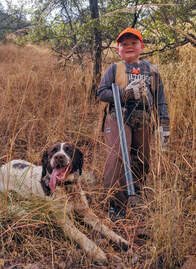 You might think with six weeks of hunting lined up we would be wiped out and ready to come home by the end. If you did, you would be mistaken. I did have to miss a day of hunting to retrieve Robert for his Christmas break visit with us, and we elected to take the following day off to do family things. We did have a few days of heavy rainfall threatening to take a day away from us, but it all worked out and we made at least a short hunt work somewhere. As mentioned, it was a big trip, with 6,606 miles driven in total, 3,498 of which were put in over 39 days of hunting. The dogs smashed 165 pounds of dog food and we hiked 180.44 miles in the pursuit of these little birds. We made new friends, had some good times with old friends.
It was clear many of the coveys had late hatches. In the early season, several birds that had been harvested were surprisingly small, covered with copious amounts of pin feathers and even bare chests! Oh my, if only we had been able to “shoot and release”, some were so small. This only reinforced our normal hunting practice of hunting only covey rises, doing what we could to deliberately leave singles and flushed birds be where they were and move on to the next. This tactic worked well for us overall, and we managed to locate 83 unique coveys of Mearns quail during our time. The dog-by-dog report:Fowler: did his typical work, which is to say, he did a nice job. Sure, he’s almost twelve now and he’s slowed down a bit. But his nose still works, and if he smelled them, he had them. He found his fair share of birds, made nice points, and of course did a fine job of locating and retrieving downed birds. Powder: had another great Mearns season even though she started this season very overweight and out of shape due to the late season Singleton she gave birth to. We had also hoped to work her using the Higgin’s Method to improve a few elements of her performance, namely steadiness after the flush/shot, but that too was sidelined by a bad shoulder injury and then her pregnancy. Despite losing that opportunity Powder crushed her eighth Mearns season. Moreover, she has done a fantastic job of teaching our other dogs the ways of the Mearns given her deliberate and consistent style of working and reliable points. Tule: had a banger early season and upon retrospect we made some errors that didn’t help her end on the note she deserved. Tule ended her summer wonderfully steady and cooperating with our other dogs with a remarkably high level of fidelity. She was a total rock star for me while guiding at Sage Canyon Outfitters. The key was, we believe, she hunted with our dogs. Dogs she knew and trusted. Dogs managed in our way or the Higgin’s way. We thought she was ready to hunt with others, and well, we were wrong. As her Mearns season progressed her performance slackened. It was unfortunate and it’s on us 100%. We will get right by her this coming summer! Ila: man, she had a rough go of it. She had a disproportionate number of hunts that held little to no birds. We even back hunted a number of those areas with her mother to again come up empty handed. Her performance was good, she did her job. But after so many dry outings it seemed to affect her confidence towards the end. As a side note, I so desperately wanted to capture video of her work for my mentor, and somehow it translated to my worst work with my GoPro, ever. And that is saying something. A videographer I am not. I recorded countless hours of the inside of my pack mostly… Jenna did begin to record us occasionally with her phone towards the end. Ila’s feet are as if set in concrete on a covey rise, and after shots are made. She even caught a quail on a covey rise without moving a foot! Ila also did great work on her ‘alright’ queue, which is the opportunity to relocate or even flush when given the queue, little more than a step or two mostly just to observe the bird flying away – just fantastic. We were frustrated for Ila. Overall, she did the work one would expect when there was work to be done from dog that will hopefully soon become a recognized Higgins Gundog. We intend to expand upon her Field skills this summer, again using only Higgins/LIMA methods. I am excited! Fizzy: now here is our success story. We started her with the Higgins System as a young pup, and she did great. Maybe a little too well. She very quickly and easily became steady to release with essentially no effort. Then she kinda seemed to stop caring about birds. With that we backed off and focused on letting her be a puppy. Not that the Higgins Method uses high pressure or the use of any lightning to get the job done. It just happened to be too much too fast for her, and we needed her to ‘love’ birds more. Fizzy started her Mearns season following, but not dogging our more experienced dogs. Due to Powder & Folwer’s pronounced stalking behavior, and me making improvements in consistency with my handling she just began to naturally co-hunt with and back them. From her earlier exposure, she knew putting up birds never pays the bills. She was a killer on singles, the only dog we intentionally hunted on flushed birds. As season progressed, she began to work more independently until one day I blew her off, opting to pay attention to Fowler & Powder. Fizzy had the covey, but overcooked it, and found herself in the middle of them when they flew. She stood there and watched them fly. As the birds flew off, I called her over and praised her for returning. After that, she knew the deal with coveys. When in doubt hang back and point. She went on to have a killer puppy season and we look forward to finishing her out the Higgins Way this summer. My mom and son visited for the holidays; we did some cool stuff and saw lots of rainbows. I caught a flushing bird in my hand! It was a good trip, and it all went by far too quickly. We are already looking forward to our return. Until then take care,
Brian & Jenna |
Categories
All
Our YouTube Content
Two GunI'm just a guy suffering with an infatuation with gundogs since childhood. Forty some years later this is what you get. Archives
July 2024
|
|
|
